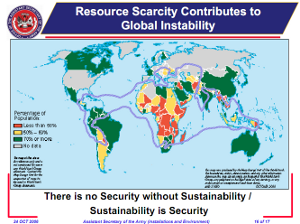
Cherokee Indians: We are free to oust blacks
US government wants second-largest Indian tribe to recognize as citizens 2,800 descendants of slaves that were held by Cherokees
Reuters & MSNBC
updated 9/14/2011 9:00:20 AM ET 2011-09-14T13:00:20
OKLAHOMA CITY — The nation's second-largest Indian tribe said on Tuesday that it would not be dictated to by the U.S. government over its move to banish 2,800 African Americans from its citizenship rolls.
"The Cherokee Nation will not be governed by the BIA," Joe Crittenden, the tribe's acting principal chief, said in a statement responding to the U.S. Bureau of Indian Affairs.
Crittenden, who leads the tribe until a new principal chief is elected, went on to complain about unnamed congressmen meddling in the tribe's self-governance.
The reaction follows a letter the tribe received on Monday from BIA Assistant Secretary Larry Echo Hawk, who warned that the results of the September 24 Cherokee election for principal chief will not be recognized by the U.S. government if the ousted members, known to some as "Cherokee Freedmen," are not allowed to vote.
The dispute stems from the fact that some wealthy Cherokee owned black slaves who worked on their plantations in the South. By the 1830s, most of the tribe was forced to relocate to present-day Oklahoma, and many took their slaves with them. The so-called Freedmen are descendants of those slaves.
After the Civil War, in which the Cherokee fought for the South, a treaty was signed in 1866 guaranteeing tribal citizenship for the freed slaves.
The U.S. government said that the 1866 treaty between the Cherokee tribe and the U.S. government guaranteed that the slaves were tribal citizens, whether or not they had a Cherokee blood relation.
The African Americans lost their citizenship last month when the Cherokee Supreme Court voted to support the right of tribal members to change the tribe's constitution on citizenship matters.
The change meant that Cherokee Freedmen who could not prove they have a Cherokee blood relation were no longer citizens, making them ineligible to vote in tribal elections or receive benefits.
Besides pressure from the BIA to accept the 1866 Treaty as the law of the land, the U.S. Department of Housing and Urban Development is withholding a $33 million disbursement to the tribe over the Freedmen controversy.
Attorneys in a federal lawsuit in Washington are asking a judge to restore voting rights for the ousted Cherokee Freedmen in time for the September 24 tribal election for Principal Chief.
» » » » [MSNBC, via Seba Ronin, RVI]






No comments:
Post a Comment